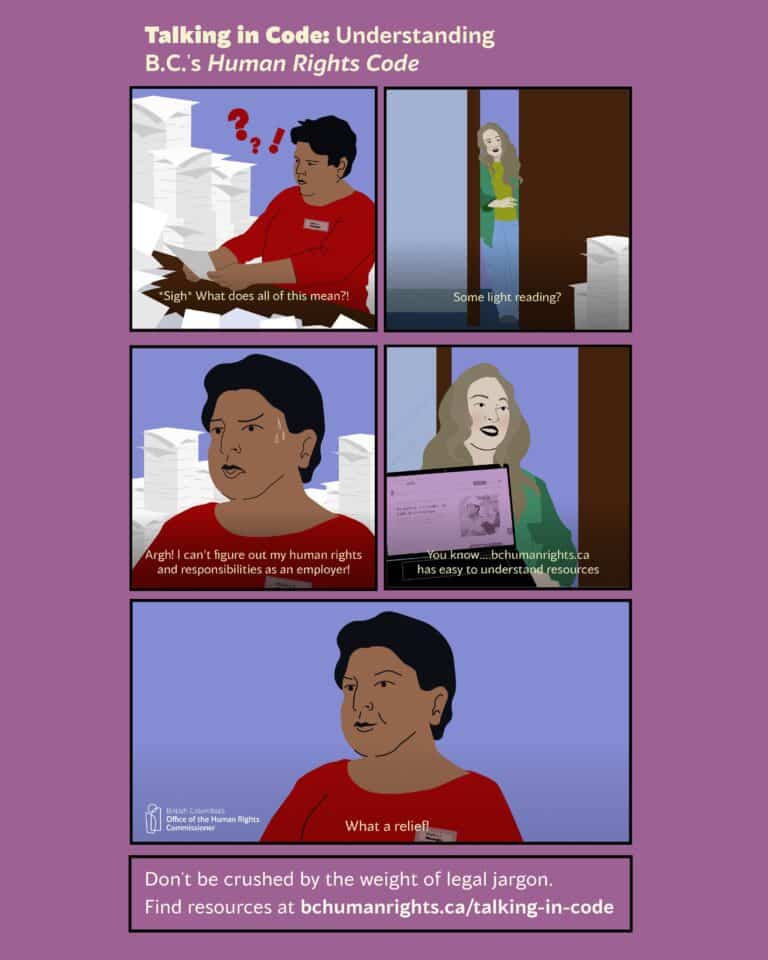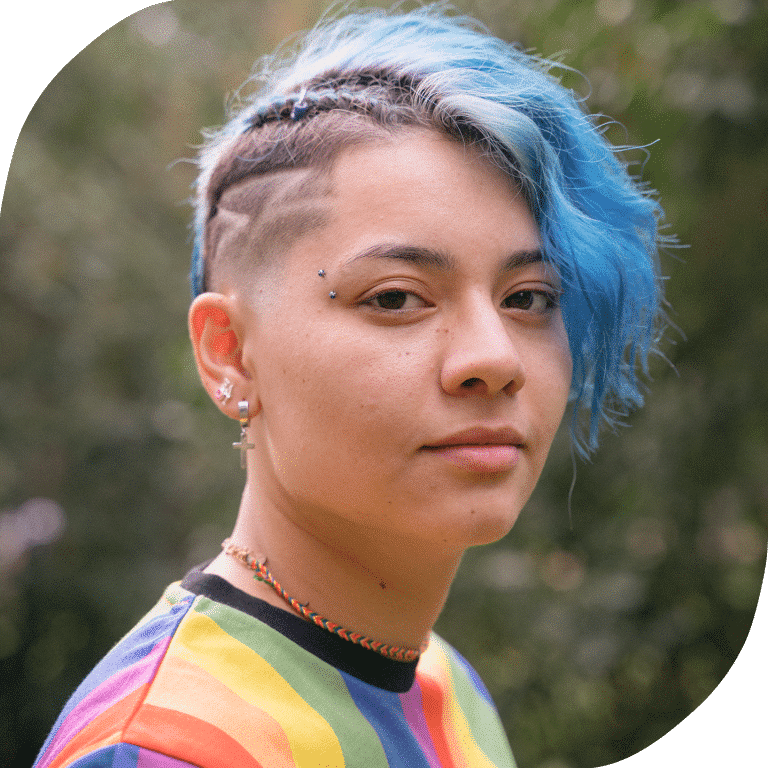What equality and non-discrimination are
Equality and non-discrimination are foundational to our concept of human rights; at their heart, human rights are premised on human dignity and a belief that we are fundamentally of equal value and deserve equal opportunities.
Our definition of equality is substantive, or equity based, which looks at the impact of a law or policy to see whether the outcome is equal for different groups of people. We recognize that sometimes for an outcome to be fair, laws, policies or institutions may need to treat people differently depending on their needs and circumstances.
What we’re doing
BCOHRC’s core purpose is to ensure the rights of everyone in our province—particularly those guaranteed by B.C.’s Human Rights Code—are protected and respected. Dismantling or restructuring the laws, policies and practices that create and sustain such discrimination as a regular part of many people’s lives is foundational to the work of the Office.
Learn more about our goals, desired outcomes and example focus areas relating to discrimination in our strategic plan, Rising to the challenge: Path to 2030.

Code workshops and resources
Our Office regularly offers free education sessions to help people understand B.C.’s Human Rights Code, which dive into three key areas covered by the Code: housing, employment and services. In addition to being offered live, recordings of these education sessions and accompanying resources are available on our Code Sessions page and are translated into 10 languages: Arabic, Chinese (simplified & traditional), Farsi, French, Hindi, Korean, Punjabi, Spanish and Filipino. In 2024/25, BCOHRC also piloted a Code workshop specifically intended for Indigenous people in B.C.
Find details about upcoming virtual sessions via our Events page or fill out our Event Request Form to book a workshop for your organization.
In addition to educational sessions, BCOHRC offers plain language resources to help people in B.C. understand their rights and responsibilities under the Code. These include resources for employers, workers, landlords, renters, service providers and people accessing services.

Other highlights
The following is a sample of our work relating to discrimination. We encourage you to read our annual reports (accessible via our Publications page) to learn more about the work we have been doing on this priority.
No wrong door
We believe that people should be able to knock on any door in B.C.’s human rights system and be assisted to find their way to the right place. Whether individuals contact our Office, BC Human Rights Tribunal or BC Human Rights Clinic, all three institutions are committed to working together to ensure that individuals receive support and referral to help them navigate the system. We called this commitment the No Wrong Door initiative, which now includes other legal clinics operating in the province.
In October 2023, we launched the interactive web portal at BCHumanRightsSystem.ca, in partnership with the Tribunal and the Human Rights Clinic at the Community Legal Assistance Society (CLAS). Building on our No Wrong Door phone triage system, the B.C. Human Rights System web portal provides a clear and concise overview of the different parts of the human rights system in British Columbia and helps people understand where they can turn for the support they need.
#RewriteTheRules campaign
For many years, disability was the most common ground of discrimination in complaints made to the BC Human Rights Tribunal. That’s one of the reasons why, in October 2022, BCOHRC launched the #RewriteTheRules campaign, which sparked a province-wide conversation about ableism among the disabled and non-disabled communities across B.C.
The campaign characterised ableism as a set of unwritten rules in our society that favors the needs and experiences of non-disabled people in big and small ways every day. Through online and display advertising—including transit and airport ads, posters and social media ads—the campaign invited people across B.C. to unpack how these rules hold us all back and inspired action toward more inclusive communities.
Improving the Code
An important example of BCOHRC’s work in this area are the recommendations we’ve made to improve B.C.’s Human Rights Code by strengthening protections for marginalized groups.
This includes conducting research and making policy recommendations on the inclusion of “social condition”—meaning social or economic disadvantage—and Indigenous identity as prohibited grounds of discrimination under the Code.
After important advocacy alongside Indigenous leadership and the Human Rights Tribunal, the B.C. government passed Bill 18, which changed the Code to explicitly include Indigenous identity as a protected ground.
However, the Code continues to fail to protect people from discrimination based on poverty or social condition. We are committed to working toward effective protections for economic rights, engaging with poverty as a human rights issue and dismantling discrimination against people living in poverty.
Clarifying the Code’s scope in the courts
BCOHRC aims to improve human rights laws and systems in B.C. through the exercise of the Commissioner’s powers to intervene in court cases that may have a systemic impact on human rights in B.C.
In 2021, the Commissioner started her intervention in Neufeld v. British Columbia Teachers’ Federation (BCTF) on behalf of Chilliwack Teachers’ Association. The Commissioner’s arguments centered on whether the BC Human Rights Tribunal has jurisdiction to hear complaints involving allegations of hate speech and discriminatory publications that are published on the internet. The Tribunal adjudicates many types of discrimination complaints, but when it comes to section 7 of the Code (discriminatory publications), the law was not clear about jurisdiction. The Commissioner argued that complaints about online hate are within the scope of the Code and the jurisdiction of the Tribunal. In its decision, the Tribunal agreed.
Learn more and find up-to-date information via our Cases page.
What we know
In 2023/24, ethnicity was the most common ground of discrimination in complaints made to the BC Human Rights Tribunal, making up 31 per cent of complaints.1
42 per cent of British Columbians say they “often” or “sometimes” avoid or have avoided posting comments to social media platforms because of possible discrimination and hate.2
More than 77 per cent of people in British Columbia believe governments should do more to identify and address sources of systemic discrimination, including in the areas of employment, housing and service provision.3
More than 55 per cent of people in British Columbia do not believe that people with disabilities receive sufficient accommodations in the workplace.4
-
- BC Human Rights Tribunal “2023/24 Annual Report”, https://www.bchrt.bc.ca/app/uploads/sites/876/2024/09/2023-2024.pdf.
- Based on an online study conducted by Research Co. on behalf of BCOHRC from March 28 to April 1, 2024, among 803 adults in British Columbia, which is a representative sample.
- Ibid.
- Ibid.
